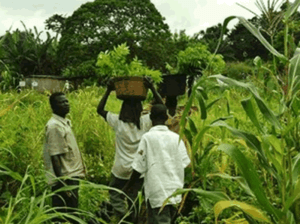Planting for Food and Jobs fraught with challenges in first year – Study
 A study to assess the implementation of the Planting for Food and Jobs programme (PFJ) in its first year has shown that the programme was fraught with a number of challenges resulting in farmers not deriving full benefits from the programme.
A study to assess the implementation of the Planting for Food and Jobs programme (PFJ) in its first year has shown that the programme was fraught with a number of challenges resulting in farmers not deriving full benefits from the programme.
The study conducted in 15 districts including Savelugu and Gushegu in the Northern Region this year showed that 87 per cent of the districts scored average in the implementation of PFJ, two per cent of the districts was rated bad and none of the districts’ performance was good.
Some of the challenges the study identified included cumbersome registration process, long distance to registration and distribution points, late distribution of seeds and fertilizers in some districts, poor quality of seeds and fertilizers and political interference.
The study was conducted by the Northern Ghana Governance Activity (NGGA), which is funded by the United States Agency for International Development (USAID) through the U.S Government’s Feed the Future Initiative.
The study amongst others assessed the availability and accessibility of services under the PFJ at the assembly level, examined issues of transparency and accountability in the implementation of the PFJ and assessed the PFJ’s benefits to smallholder farmers.
The findings were presented at a regional dialogue in Tamale on one-year implementation of PFJ where participants included District Directors of the Department of Agriculture and some civil society organizations (CSO) in the region.
The study recommended that Metropolitan, Municipal and District Assemblies/Ministry of Food and Agriculture should establish a public- private partnership arrangement with agro-input dealers to sell seeds just like the fertilizers is being done to farmers in 2018 by using the coupon system.
It also recommended that a 40 per cent quota be reserved for women farmers at the district level as part of a conscious effort to target women to benefit from the PFJ.
It said MoFA and Departments of Agriculture should use a multi-pronged approach in communicating the benefits and modalities of access to PFJ adding that information on PFJ be presented in various dominant local languages and aired on community radios.
It called for timely release of adequate quantities of fertilizers and seeds to MMDAs such that farmers would plant on time.
It also expressed need for the government to make adequate provision in the budget for logistical support such as motorbikes and fuel for extension service agents to effectively perform their duties to improve agricultural production.
Mr Langkuu Festus Aaron, Northern Regional PFJ Desk Officer, said measures have been instituted to ensure that the challenges encountered during the first-year of the PFJ did not occur during subsequent farming seasons.
Mr Mohammed Mumuni, Team Leader, Northern Region Networking Centre of SEND-Ghana, urged government to make public the policy document on the PFJ to guide its implementation saying the absence of the document was partly responsible for some of the challenges identified in the study.
The USAID NGGA is a five-year project to strengthen responsive governance for improved agriculture development in the country through strengthening institutional capacity for effective coordination and integration of key actors in decentralized agricultural development in the country.
It is implemented by a consortium of non-profit groups, led by CARE International, Action Aid Ghana, SEND-Ghana and WANEP-Ghana.
Source: GNA
